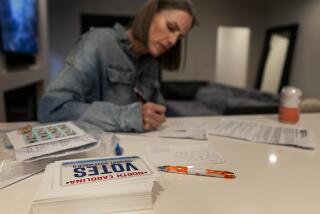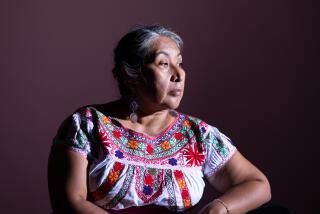MIND YOUR CIVIC MANNERS : Good Citizens Know That Playing by the Rules Applies at Any Age
- Share via
All these months of political campaigning, all the bloviating about little-c citizenship, as in illegal immigration . . . but not a word about capital-c Citizenship, as in how to be a good one.
The last I heard it talked about without a smirk was in grade school, somewhere between hygiene and music.
It’s obvious why Citizenship isn’t in any candidate’s position paper: Where’s the political hay in sermonizing like a Chautauqua orator about the very people you want to support you?
With all those murderers and welfare layabouts out there to chastise, what politician wants to sound so crabby and petty as to remind working people, middle-class people, to care for their children, vote responsibly, spay and neuter their pets, support parks and libraries, conserve water and recycle trash, refrain from dumping oil down drains, volunteer for something once in a while, keep their music to themselves and signal when they change lanes?
We know all that already, we would say in offended tones, bristling because some politician--imagine, a politician!--was telling us we could do better.
Citizenship is really little more than the conscious practice of civic etiquette, the public manners that make the places we live workable when we practice them, and unbearable when we don’t.
Gene Autry’s commandments for cowboys, someone once told me, were fair play, truthfulness, respect for women, parents, animals and old folks, religious and racial tolerance, and cleanliness of thought and speech.
Yet these sound so sappy, so smug, so middle-class and middle-American that I had to solicit a reality check. I got it from some children whose young lives are about as different from mine, from Pete Wilson’s or Kathleen Brown’s, as you could find in the same city.
They are students at Ninth Street school, a Skid Row elementary in Los Angeles. Their parents, when they have more than one, are poor; a few are drunks or junkies.
The litter these kids see on their way to school from the hotels where many of them live, isn’t just fast-food wrappers; it’s used needles, used condoms, used-up booze bottles. Across the street, transvestite hookers in evening dress loiter at 9 in the morning. Some of these children have seen more blood and dead bodies by kindergarten than I will see by the time I retire from a lifetime in journalism.
I asked them to tell me what it means to be a good citizen, and here is what they wrote:
“It’s when you try hard.”--Gemayal
“It’s belonging to a club.”--Lauren
“When everybody learns to read.”--Kevin
“When you pay attention to the teacher and don’t act crazy.”--Liscette
“Don’t get the buses dirty.”--Daisy
“Stop taking stuff.”--Linh
“When someone learns to read, write and work well.”--Virginia
“Don’t pinch other people.”--Alberto
“Not fighting. Solve problems with words.”--Everth
“What makes a good citizen is a person who respects the people who surround them and also obeys the rules and is friendly to everybody he sees.”--Eric
“To be a good citizen, you don’t have to do things like rob or litter.”--Melissa
“A good citizen is good people who don’t run away from the police or do many felonies. A good citizen is somebody that helps out and pitches in.”--Paloma
“If somebody falls, you say, ‘Are you OK?’ and help them up.”--Nancy
“Don’t write on the walls. Don’t use guns.”--Andres
So perhaps the standards, the dreams, don’t change as we grow up, only the scale. Don’t be a bully, try hard, help out, don’t break the rules.
And, as Estela says: “Share your toys.” She has my vote.
More to Read
Get the L.A. Times Politics newsletter
Deeply reported insights into legislation, politics and policy from Sacramento, Washington and beyond. In your inbox twice per week.
You may occasionally receive promotional content from the Los Angeles Times.











